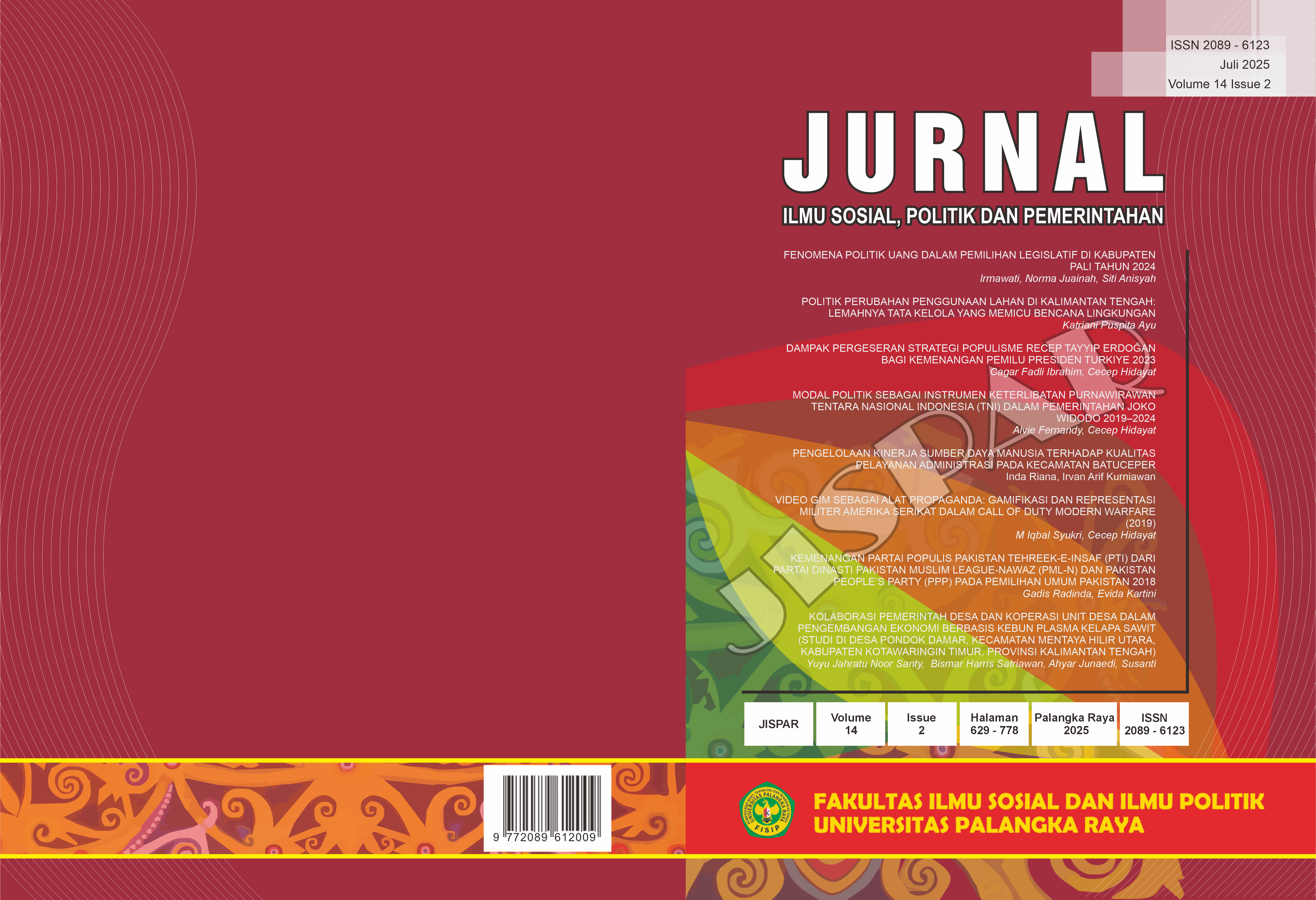Dampak Pergeseran Strategi Populisme Recep Tayyip Erdoğan bagi Kemenangan Pemilu Presiden Turkiye 2023
DOI:
https://doi.org/10.37304/jispar.v14i2.20787Keywords:
Erdoğan, Pemilu, Populisme, Strategi, TurkiyeAbstract
Penelitian ini mengkaji mengenai populisme sebagai strategi politik yang menjadi ciri khas pemerintahan Recep Tayyip Erdoğan di Turkiye. Melalui strategi populisme, Erdoğan berhasil mempertahankan kekuasaannya sejak 2002 hingga saat ini. Namun, sepanjang perjalanannya, strategi populisme yang digunakannya mengalami pergeseran, terutama dalam membangun narasi tentang ‘ancaman’ yang dihadapi oleh Turkiye. Pergeseran ini terlihat dari perubahan fokus ‘musuh bersama’ yang awalnya bertumpu pada perlawanan terhadap elite sekuler menjadi retorika anti-Barat dan dewesternisasi. Selain itu, populisme yang diterapkan Erdoğan juga dikritik karena dianggap berkontribusi terhadap kemunduran demokrasi di Turkiye, dengan semakin kuatnya kontrol negara atas media, oposisi politik, dan kebijakan domestik. Meskipun demikian, kondisi tersebut tidak menghalangi dominasi elektoralnya dalam Pemilu Presiden 2023, di mana Erdoğan kembali memenangkan kursi kepresidenan untuk ketiga kalinya. Fenomena ini menjadi menarik untuk dikaji guna memahami bagaimana pergeseran strategi populisme Erdoğan dapat berkontribusi terhadap keberhasilannya dalam mempertahankan kekuasaan. Untuk menganalisis fenomena tersebut, penelitian ini menggunakan metode kualitatif dengan pendekatan induktif, yang berfokus pada pengumpulan data melalui in-depth interview serta analisis sekunder dari jurnal akademik, laporan kebijakan, dan media berita.
Downloads
References
Akbiyik, A., & O’Donohue, A. (2023). Why do populist incumbents survive economic crises? How economic appeals won voters in Turkey’s 2023 election. Harvard Kennedy School.
Aksit, B. (2023). Erdoğan secures third term as Turkey's president. BBC News. https://www.bbc.com/news/world-europe-65503015.
Audrey, H. (2023). Crisis in Turkey: An Analysis of Socio-Political Challenges and Economic Implications. ENDLESS: International Journal of Futures Studies, 6(2), 429–438 .
Aydin-Duzgit, S., Kutlay, M., & Keyman, E. F. (2023). How Erdoğan Rules Through Crisis. Journal of Democracy, 34.
Bilgin, A., & Öztürk, A. (2023). Democracy and opposition in Turkey: An introduction to the special issue. Zeitschrift für Vergleichende Politikwissenschaft, 17(3), 323–327. https://doi.org/10.1007/s12286-023-00590-8.
Cagaptay, S. (2002). The November 2002 elections and Turkey's new political era. Middle East Review of International Affairs, 6(4), 42–48.
Canveren, O., & Kaiser, A. (2024). Exploring populism in Erdoğan’s discourse on Turkey-European Union relations. Czech Journal of International Relations, 59(3).
Castaldo, A. (2018) Populism and competitive authoritarianism in Turkey. Southeast European and Black Sea Studies, https://doi.org/10.1080/14683857.2018.1550948.
Creswell, J. W., & Creswell, J. D. (2018). Research design: Qualitative, quantitative, and mixed methods approaches (5th ed.). SAGE Publications.
DeHanas, D. N., & Shterin, M. (2018). Religion and the rise of populism. Religion, State and Society, 46(3), 177–185. https://doi.org/10.1080/09637494.2018.1502911.
Fide, E. B. (2020). The Authoritarian Shift of the Populist Discourse in Turkey. Sobre jornalismo, 9(1) 180₋193.
Hoffman, M., Werz, M., & Halpin, J. (2018). Turkey’s ‘New Nationalism’ Amid Shifting Politics: Further Analysis of Polling Results. Center for American Progress.
Kaliber, A., & Kaliber, E. (2019) From De-Europeanisation to Anti-Western Populism: Turkish Foreign Policy in Flux. The International spectator, 56(4), 1₋16. https://doi.org/10.1080/03932729.2019.1668640 .
Kirby, P., & Goksedef, E. (2023) Turkish election victory for Erdoğan leaves nation divided. BBC News. https://www.bbc.com/news/world-europe-65743031.
Korkut, U., Basbugoglu, T., & Sahin, O. (2023). Turkey’s 2023 elections: Another victory for Erdoğan. Political Insight.
Kutlay, M. & Öniş, Z. (2024). Governance crises and resilience of authoritarian populism: 2023 Turkish elections from the perspective of Hirschman’s ‘exit, voice, and loyalty’. Southeast European and Black Sea Studies, 24(2), 383–403. https://doi.org/10.1080/14683857.2024.2315652.
Levitsky, S., & Way, L. A. (2010). Competitive authoritarianism: Hybrid regimes after the Cold War. Cambridge University Press.
Lofflmann, G. (2022). Introduction to special issue: The study of populism in international relations. The British Journal of Politics and International Relations, 24(3), 403–415. https://doi.org/10.1177/13691481221103116.
Meydan, V. (2024). Right-wing populism vs. left-wing populism: Clash of alliances in the Turkish political system. Pamukkale University Journal of Social Sciences Institute, 60, 385–399. https://doi.org/10.30794/pausbed.1335757.
Moffitt, B. (2016). The global rise of populism: Performance, political style, and representation. Stanford University Press.
Öniş, Z. (2023). Turkey’s New Presidential Regime: Fragility, Resilience, Reversibility. Reflektif Journal of Social Sciences, 4(1), 159–179.
Öniş, Z. & Kutlay, M. (2020). The Anatomy of Turkey’s New Heterodox Crisis: The Interplay of Domestic Politics and Global Dynamics. Turkish Studies, 22(4), 499–529. https://doi.org/10.1080/14683849.2020.1833723.
Ormeci, O. (2023). 2023 Turkish elections: What is at stake, and what are the possible scenarios following the elections? ADAPT Institute.
Poli, M. D. (2016). Contemporary populism and the economic crisis in Western Europe. Baltic Journal of Political Science, 5(1), 41–50. https://doi.org/10.15388/BJPS.2016.5.10335.
Puskapol UI. (2014). Panduan praktis metode penelitian sosial. Pusat Kajian Politik, Departemen Ilmu Politik FISIP UI.
Qaseem, N. M., Nor H. M., & Azhana, M. (2016). Lessons learned from the electoral experience of the Justice and Development Party (Adalet ve Kalkınma Parti) 2002-2011. Journal of Indonesian Social Sciences and Humanities, 6(2), 43–52.
Sen, M. (2010). Transformation of Turkish Islamism and the rise of the Justice and Development Party. Turkish Studies, 11(1), 59–84. https://doi.org/10.1080/14683841003747047.
Spáč, P., Matejova, M., Jusko, J., & Voda, P. (2024). Shaky ground, shaky politics? Effects of Türkiye’s 2023 earthquakes on Erdoğan’s political survival. Environmental Hazards.
Taş, H. (2022). Continuity through change: Populism and foreign policy in Turkey. Third World Quarterly, 43(12), 2869–2887. https://doi.org/10.1080/01436597.2022.2108392.
Taş, H. (2022). The formulation and implementation of populist foreign policy: Turkey in the Eastern Mediterranean. Mediterranean Politics, 27(5), 563-587. https://doi.org/10.1080/13629395.2020.1833160.
Turk, H. B. (2018). Populism as a medium of mass mobilization: The case of Recep Tayyip Erdoğan. International Area Studies Review, 21(2), 150–168. https://doi.org/10.1177/2233865918761111.
Tuysuz, G., Gezer, Y., & Qiblawi, T. (2023). Erdoğan wins Turkish election, extending rule to third decade. CNN. https://edition.cnn.com/2023/05/28/europe/turkey-president-runoff-polls-Erdoğan-intl/index.html.
Yardimci-Geyikci, S., & Yavuzyilmaz, H. (2024). The 2023 Turkish election: A tale of two campaigns and the duel of populisms. Southeast European and Black Sea Studies, 24(2), 259–275. https://doi.org/10.1080/14683857.2024.2315650.
Yilmaz, I., & Morieson, N. (2023). Civilizational Populism in Domestic and Foreign Policy: The Case of Turkey. Religions, 14. https://doi.org/10.3390/rel14050631
Yilmaz, I. (2021). The AKP’s authoritarian, Islamist populism: Carving out a new Turkey. European Center for Populism Studies.
Yilmaz, I., & Morieson, N. (2024). The Rise of Authoritarian Civilizational Populism in Turkey, India, Russia, and China. Populism & Politics (P&P). European Center for Populism Studies (ECPS). https://doi.org/10.55271/pp0033.
Downloads
Published
How to Cite
Issue
Section
License
Copyright (c) 2025 Cagar Fadli Ibrahim, Cecep Hidayat

This work is licensed under a Creative Commons Attribution 4.0 International License.








